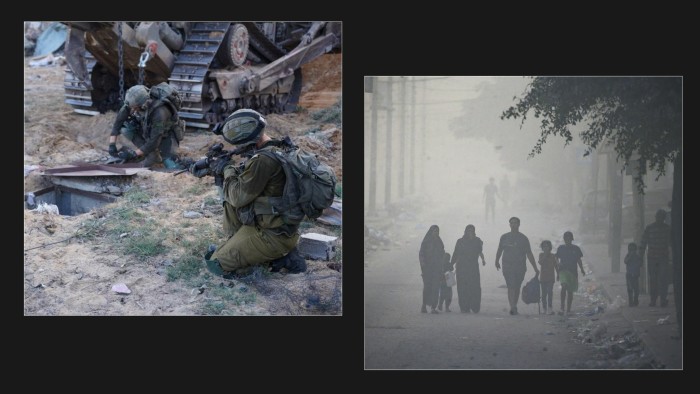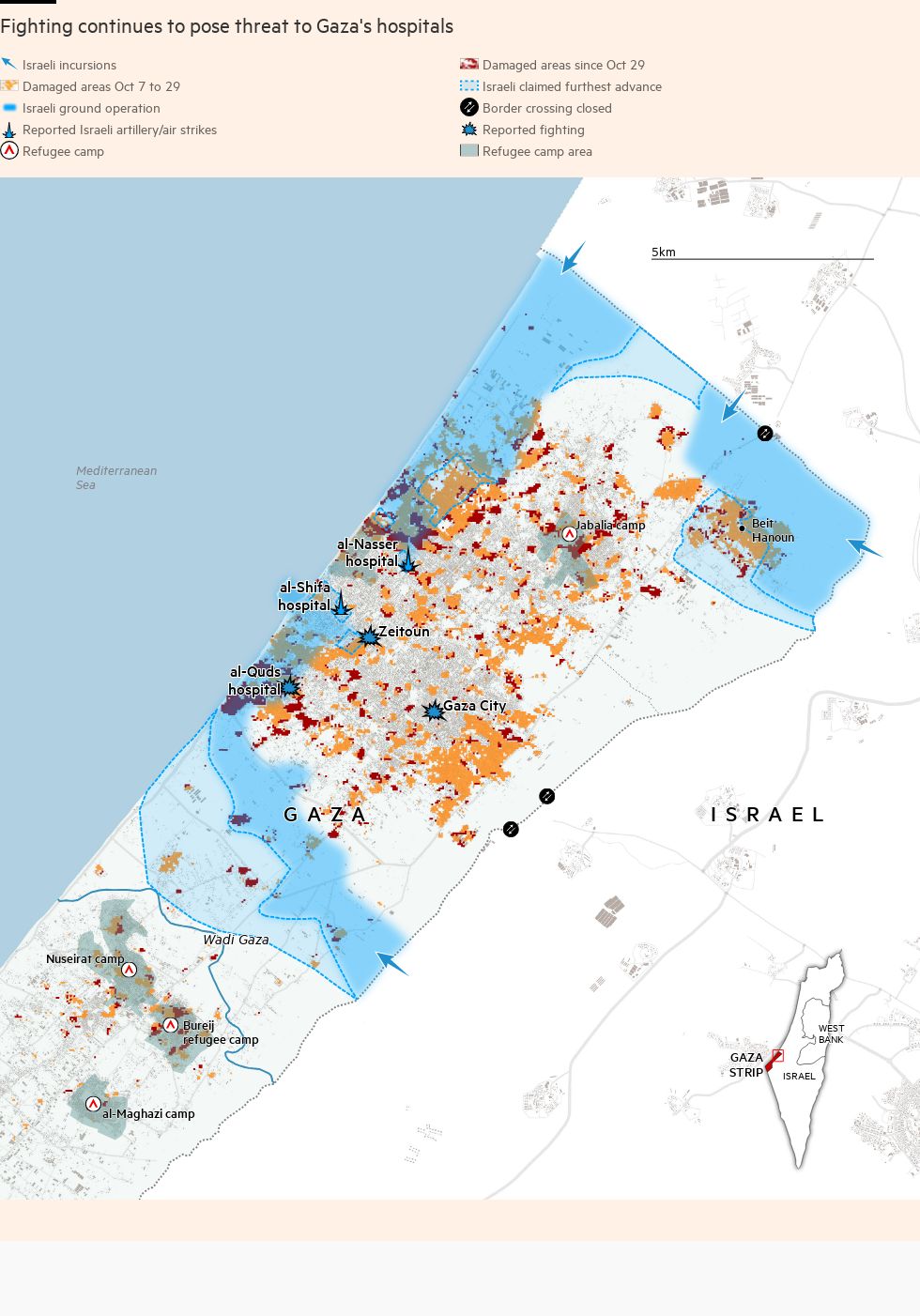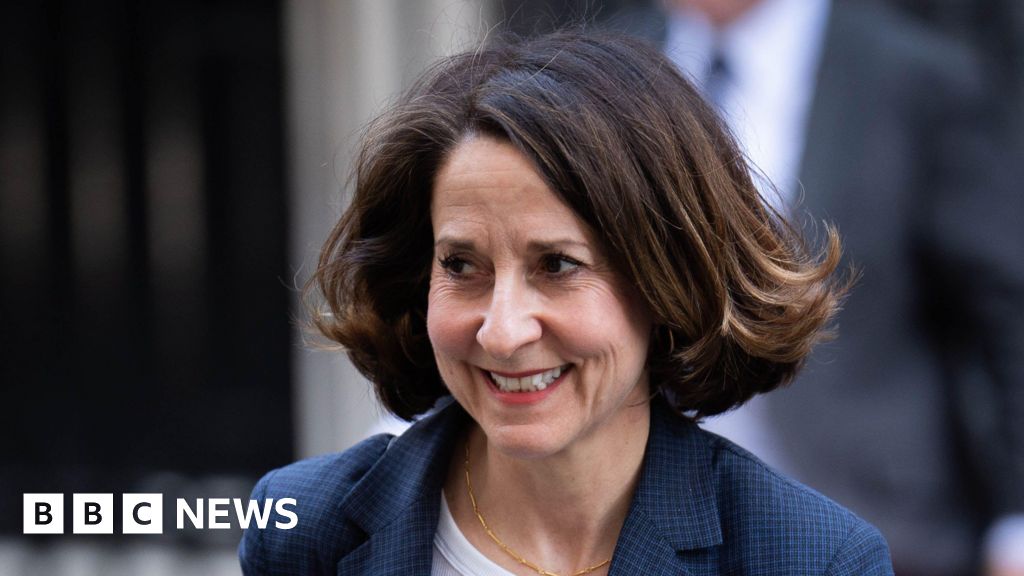US President Joe Biden said on Monday that hospitals in Gaza “must be protected”, after Israeli forces surrounded the strip’s largest medical facility, with air strikes and gunfire making it impossible for civilians to escape.
Al-Shifa hospital, in the heart of Gaza City, ran out of fuel over the weekend, local officials and the World Health Organization said, risking the lives of patients as fighting raged just outside its doors.
Efforts by the Israel Defense Forces to take control of the site have become a diplomatic flashpoint between Israel and its allies. The US and EU have asked Israel to show restraint as the scenes at the hospital — including newborn babies being kept warm outside non-functioning incubators — spur support in Arab and some western capitals for a ceasefire to protect Palestinian civilians.
“My hope and expectation is that there will be less intrusive action relative to hospitals and we remain in contact with the Israelis,” Biden told reporters. He added that negotiations were continuing over a pause in fighting to secure the release of prisoners.
“So I remain somewhat hopeful, but hospitals must be protected,” the president said.
Jake Sullivan, Biden’s national security adviser, said Israel had offered assurances that it was seeking to avoid harming patients.
“We do not want to see firefights in hospitals, we want to see patients protected, we want to see hospitals protected. We have spoken with the Israeli government about this and they have said share that view,” Sullivan said.
The fighting around al-Shifa came as Israel and Hizbollah, the Iran-backed militia in Lebanon, traded cross-border fire amid fears that the conflict could spill over into the region, an outcome the US has sought to avoid with a flurry of Middle East diplomacy.
Israel’s Prime Minister Benjamin Netanyahu on Monday warned that attacks against the country’s soldiers and civilians in the north was “playing with fire” which would be “met by much stronger fire”. He went on: “They should not try us because we have shown only a little of our might.”
The campaign to expel Hamas militants from the coastal enclave was triggered by the armed group’s devastating rampage through southern Israel on October 7. Hamas militants killed more than 1,200 people, mostly civilians, and took about 240 hostages, according to Israeli authorities.
More than 11,000 Gaza residents have been killed in Israel’s retaliatory bombardment and ground incursion into the strip, according to Palestinian health officials.
Israel claims that al-Shifa is a significant site for Hamas’s operations because it sits on top of an underground infrastructure that the IDF intends to destroy. Doctors at al-Shifa have denied the claim, and said several premature babies and patients had died after the hospital ran out of fuel, and that thousands of patients, medical personnel and civilians were sheltering at the hospital.
“The situation is dire and perilous,” WHO director-general Tedros Adhanom Ghebreyesus said on social media platform X after speaking to doctors at the hospital. “The constant gunfire and bombings in the area have exacerbated the already critical circumstances. Regrettably the hospital is not functioning as a hospital anymore.”
The Gaza health ministry described al-Shifa as under “complete siege”, saying there were more than 100 bodies that were beginning to decompose and there was “the smell of corpses” everywhere. It said that 8,000 displaced people were sheltering at al-Shifa, and there was no food or fresh water. It also said that Israeli aircraft were targeting anyone who left the facility.
Israeli soldiers left 300 litres of fuel — enough for less than an hour of the hospital’s needs — at the hospital’s gates on Sunday, an amount that the health ministry in Gaza told Al Jazeera was a “mockery”.
Thomas White, director of the UN Relief and Works Agency’s affairs in Gaza, posted on X that “the humanitarian operation in Gaza would grind to a halt in the next 48 hours as no fuel is allowed to enter” the territory.
UNRWA had run out of fuel for its own trucks so it could not receive aid coming through the Rafah crossing on Tuesday, he said. Two UNRWA water distribution contractors had also ceased operations on Monday after they ran out of fuel, White said, “which will deny 200,000 people potable water”.
“A tough decision — fuel for a hospital or fuel to produce drinking water — both save lives. Unfortunately, this is not hypothetical,” he wrote.
Sullivan said the US had sought assurances from Israel that it would deliver fuel to hospitals.
“The Israeli government has . . . told us they are prepared to provide fuel to hospitals to ensure that they can continue to operate,” he said, adding that Israeli officials had indicated they had unable to contact people running some of the hospitals.
The intensity of the cross-border attacks between Israel and Hizbollah increased over the weekend following a speech by Hassan Nasrallah, the militant group’s leader, who warned that the Lebanese front would “remain active”.
Hizbollah claimed that anti-tank missile fire wounded Israelis working on repairing electricity infrastructure near the border. It was the most serious incident involving civilians since an Israeli strike killed a Lebanese woman and three children on November 5.
Israel-Hamas war: 2-minute briefing

Stay informed with a summary of the latest events plus FT analysis, comment and features
Israel responded with strikes late on Sunday on what it described as Hizbollah military infrastructure. Intense cross-border shelling continued overnight, with several Israeli soldiers injured in the exchanges.
“The IDF has operational plans to change the security status in the north,” warned Rear Admiral Daniel Hagari, an Israeli military spokesperson, raising fears of a wider escalation on the northern front.
The US carried out air strikes on what defence secretary Lloyd Austin described as “facilities in eastern Syria used by Iran’s Islamic Revolutionary Guard Corps and Iran-affiliated groups”.
Credit: Source link












